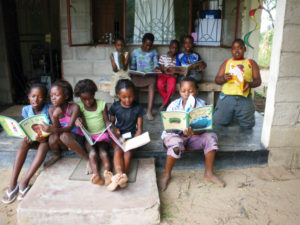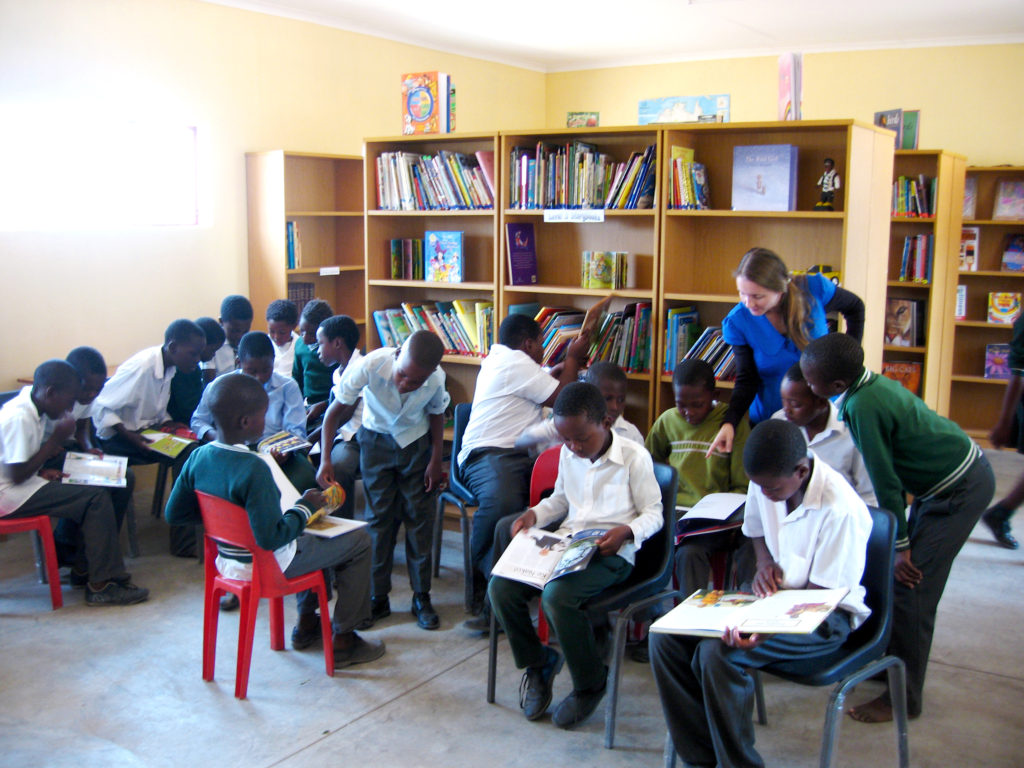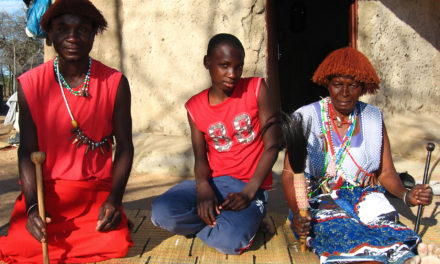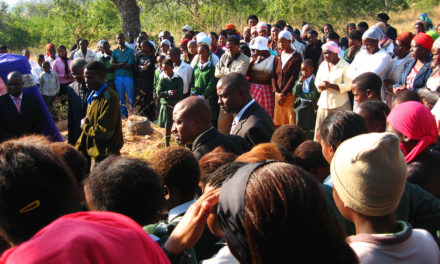Nothing is static with us. Everything is moving and changing, transforming from one thing to another, or even just developing subtle variations, but nothing is still. Blaise Pascal, the famous French mathematician and theologian, wrote: “Our nature is in movement, complete rest is death.”
In the same way, Dumphries, our village where we’ve lived and done development work over the last two years, is changing. It can’t help but change. The Shangaan people, the people of Dumphries, are just one small group of people in a large country and in a larger world. People born and raised in Dumphries are moving to and from the major cities of South Africa. A large group of people born and raised in Mozambique have moved to Dumphries.
Nearby private game lodges bring guests from all over the world and quite a few of them visit our little village for a few hours at a time. Many Dumphries residents work at those same game lodges, adapting to the work environment and to the multitude of cultural idiosyncrasies of their various guests, who come from such far-flung places as India, Australia, Singapore, England, and the US, often all in attendance on the same day. Dumphries can’t help but change; and its residents aren’t always in control of their own change.
Without a doubt, Lora and I, living here in Dumphries, are a part of the change. Our personalities, our words, and our actions all influence the thoughts and opinions of Dumphries residents about Americans, about all people of our same skin color, and about the nature of life in general. The work we do and have done in our two primary schools influences people’s thoughts and beliefs about education.
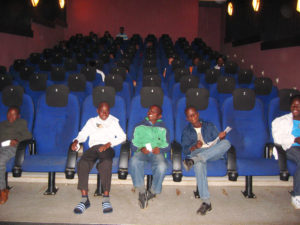
On a recent field trip to Pretoria, we also had the chance to take the kids to a movie theater for their first time ever.
Not only that, through our presence and interaction we’ve also influenced an entire generation of Dumphries kids who will one day spread across this country, this world, or stay at home in Dumphries and see this little village into the future. But they’ll all be changed, and are already changing, as a result of our presence and the lives we’ve lived here.
Whether it’s at all possible to live in a foreign culture and community without influencing it can be debated, but it’s certainly not possible in our positions. The major part of our work as Peace Corps Volunteers, and more generally as development workers, is to oversee the change in a society and a culture and to try to help direct it towards positive ends.Typically according to anthropological studies, the person visiting and observing the new culture isn’t supposed to be changing or influencing it at all. You can think of it as similar to an endangered species, something that’s supposed to be protected from outside influences and dangers which threaten its existence. Traditional cultures are like that: fragile and close to extinction because of modern globalization. And anthropological studies generally seek to preserve them as they are, attempting not to influence them at all.
That’s quite a lofty position to be in. Being an outsider, overseeing a societal and cultural change is one thing; directing it towards something “positive” is quite another. Anything traditional in the culture of the people we’re living among has been that way for centuries or even millennia. It’s developed as a way of coping with their own environment and their own society and surviving at least at a minimal level. Essentially, it has proven to work, and work well enough, for a very long time.
Now, their environment and their society is changing rapidly, and with it is also coming rapid cultural change. In some of the changes, there is no choice available; it must be a certain way for the people to continue to survive. But in plenty of the other changes where there is a choice, no one has any real idea what the changes should look like, what directions they should choose, or even what vast range of directions are available. For a person to search out all these things and choose from among them the one that is most “positive” is very difficult, to say the least.
As outsiders with only a faint glimpse at where the people are coming from, and an even dimmer view of where they’re going, what ability do we truly have at all to choose the best change for them? And this is all beside the question of the challenges and obstacles we face along the way in the process of directing and implementing whatever change we’ve chosen.
Nonetheless, here we are living in Dumphries, working in the village and in two primary schools, and making significant changes that will impact many of these people and their lives forever. We often have to question ourselves about whether the change we’re making can truly be considered to be “positive”, and we often fall short of any solid answers.
This culture is traditionally so much more community-centered. When kids are testing in school, it’s culturally accepted, and expected, to copy off the other kids and share answers freely so that everyone “does well”. But the school system itself is the product of a very individualistic culture, one not their own.
This form of education, with classrooms and professional teachers and textbooks and assignments and tests, was all introduced by the Western world. And now it’s a requirement for all South African kids to attend school up until a certain age. And it’s a requirement for them to adjust to the Western-based educational system and even succeed within it if they want to succeed in life in their new society, if they want to pursue the goals the new society offers them. And they do want that, the vast majority of them.
So they can’t cheat on tests or freely share answers; it’s not allowed in the Western world that’s growing ever stronger and more influential around them, changing their own culture even from within. So we try to help the students learn how to turn in their own work, write their own answers, and think for themselves; we even try to help the teachers understand that and how to teach it.
In their educational system, Western-based as it is, it’s a big priority that the kids be literate, that they can read and write and understand and interact with printed information. Maybe because it’s so new to their culture or maybe because of the deliberately dumbed-down education they received in the past, but whatever the reason, basic literacy is still a huge struggle in our community and in plenty of rural communities like it throughout South Africa.
So we’ve both tried (but Lora especially) to address that issue, to improve literacy through a large variety of programs, from basic alphabet teaching, to the process of reading stories, enjoying books, and writing letters. We’ve even started a library at each school, something they’ve never had before and with which even their teachers have never had much of any experience. We’ve had mixed success in some of the efforts, but overall they’ve worked. Literacy is beginning to improve in our schools and an excitement for the written word is quickly developing.
It’s a big change, but is it actually positive? After all, reading and writing is almost inherently a very individualistic thing. The person usually sits alone to read a book and praise is given when kids learn to read silently. The person writing a letter is alone and rarely in the presence of the person reading it. The more a person excels at and enjoys reading and writing, the more they learn to think for themselves and succeed in those systems that promote individual thought, sure, but do they not also start to forget the community that’s fostered their development?
But literacy tends to take that away. Reading and writing become a very individually-based experience. Stories become unchanging and community-specific or event-specific variations become difficult or discouraged. The narrative and the values it promoted become static, almost set in stone.The whole manner of thinking about the importance of stories and narrative changes. In non-literate and community-focused societies, it was a very social event, everyone gathering together to share in story. And the story itself was flexible and changeable depending on the narrator. But the narrator would make the changes based on the particular audience or the history of the community or even based on recent events which call for one conclusion or another to reinforce the society’s values.
With increased individualism like this, a society becomes free to be more pluralistic, with people diverging more individually, and accepting others’ divergence more readily. This is often a positive thing when our world expands like it has to include so many people who are already different. But it can also cause a society to run the risk of altogether losing its shared direction. I think that’s happening in many parts of the world, including South Africa.
A lot of these ideas really came to the surface for us after a conversation with one of our Principals one day. He’s a very intelligent man, well-spoken, friendly and outgoing, loves his family deeply, and he has many of his own thoughts and opinions, something often rare here. And he really enjoys reading, when he has time for it. So, we’ve loaned him some of our books from time to time and I often ask him his thoughts as he’s reading them.
The conversation came up when our Principal said he hadn’t had the opportunity to read for quite some time. His wife doesn’t like him to read. That surprised me. Reading, of course, is so highly valued in our own culture that even when people don’t take the time for it themselves they usually appreciate and praise people who do take the time. So I was surprised that his wife doesn’t like him to read.
Our principal said that when his wife is around, she doesn’t want him to be keeping to himself with his nose in a book. She thinks it’s like ignoring her and instead she wants him to be able to simply “look at her face.” She doesn’t want to sit next to him while they both read. She doesn’t want him to sit next to her while he reads. She doesn’t even necessarily want him to engage her in conversation. She wants him to simply just be there with her, doing nothing except maybe “looking her in the face.”
On the one hand, it’s an example of traditional cultural values becoming directly threatened by newer ones, and reacting to the threat. But on the other hand, it’s an example of a situation that us Americans are rarely likely to encounter. And I think it says something about the nature of relationships and time spent with each other, something that may no longer be heard once literacy really fully takes hold in our community here and in South Africa as a whole.
Life and culture for most people here in South Africa has historically been free from many kinds of distractions. There are lots of chores to do and some very hard work from time to time. But in the past there wasn’t much of any media to be consumed, and what there was – story-telling traditions – was available to the whole group at once and was very much interactive and socially constructive. But many things now imported from the Western world, literacy included, is changing that life and culture drastically.
In a few generations, who will still be able to tell the story of his attempts at reading and his wife’s resistance so that her husband can simply sit there and “look in her face”? Maybe no one. Won’t everyone here in South Africa be so busy, so individually engrossed in the media available, with an accompanying culture to promote that lifestyle, that it would be considered ridiculous to spend time simply sitting and looking at someone’s face and doing nothing else? And who would understand his wife if she asked that of him and who would then be in the right state of mind to give that to her? I barely understand the idea myself and I’ve spent a lot of time thinking about it within its cultural context – a cultural context that I’ve had the chance to live immersed in for the last two years.
That culturally-founded message of silent love and existence, of proximity and relationship, and many of the other messages we’ve learned in our time here, may no longer exist in the near future. Like an endangered species on the brink of extinction.
But we’re not strictly anthropologists. And even if we ourselves could somehow avoid influencing the culture and society we’re observing and living in, they themselves can’t avoid the influence and the change that comes from the vast multitude of other encounters they have with the rest of the world. It’s impossible. As they say, no man is an island. I think in the present globalizing world, no one community is an island either.
The world is changing. No one knows for sure into what or even exactly what it should change into. But that it’s changing, no one can doubt and no one can successfully resist. Maybe as some of these old messages disappear, some new and just as valuable ones will be heard more clearly.
The kids of Dumphries need literacy to succeed in the modern world. Their world is now much bigger than Dumphries whether they like it or not and whether we like it or not. So our attempts at “positive” change are hopefully enough to somewhat prepare them for what they’ll likely face in the future. We hope it will give them some say in the change that’s happening to them and to Dumphries, even though at the same time it takes away some choices in other areas. After all, once a kid finds himself individually engrossed in a great book, and then one after another, he’s forever severed some small connection to that community story-telling past.
And keeping all this in mind helps keep us humble, and listening. Those are traits we need. Whatever we think is “positive” for someone else and for their culture, is not always so. It’s best to listen to their own stories, of their fears and hopes for their own future and the changes occurring. We then offer whatever we can to bring them to their hopes. And we know that we might still mess up along the way, or that they may never arrive there but branch down a different path sometime later. But we can listen to their stories and the messages they hold. If the stories won’t still exist in a few generations, then at least we can keep them in mind now.
I like what our Principal’s wife is saying. Sometimes we should stop doing. We should come back out of our own world and our own activities. Even words and speech often aren’t enough. Literacy can be a help for many things, but it can also be a distraction from what’s unable to be contained in words. It reminds me of the ending of one of C.S. Lewis’s greatest books, “Till We Have Faces”, where the main character says:
“I know now, Lord, why you utter no answer. You are yourself the answer. Before your face questions die away. What other answer would suffice?”
Or as said in Psalms 46:10, “Be still and know that I am God!” It’s a message worth remembering.

